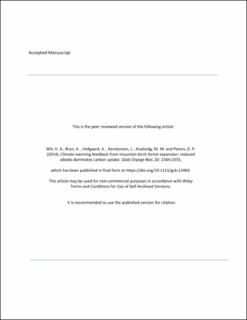Climate warming feedback from mountain birch forest expansion: Reduced albedo dominates carbon uptake
de Wit, Heleen; Bryn, Anders; Hofgaard, Annika; Karstensen, Jonas; Kvalevåg, Maria Malene; Peters, Glen Philip
Peer reviewed, Journal article
Accepted version

View/
Date
2013Metadata
Show full item recordCollections
- Journal articles [478]
Abstract
Expanding high elevation and high latitude forest has contrasting climate feedbacks through carbon sequestration (cooling) and reduced surface reflectance (warming), which are yet poorly quantified. Here, we present an empirically-based projection of mountain birch forest expansion in south-central Norway under climate change and absence of land use. Climate effects of carbon sequestration and albedo change are compared using four emission metrics. Forest expansion was modeled for a projected 2.6 °C increase of summer temperature in 2100, with associated reduced snow cover. We find that the current (year 2000) forest line of the region is circa 100 m lower than its climatic potential due to land use history. In the future scenarios, forest cover increased from 12 to 27% between 2000 and 2100, resulting in a 59% increase in biomass carbon storage and an albedo change from 0.46 to 0.30. Forest expansion in 2100 was behind its climatic potential, forest migration rates being the primary limiting factor. In 2100, the warming caused by lower albedo from expanding forest was 10 to 17 times stronger than the cooling effect from carbon sequestration for all emission metrics considered. Reduced snow cover further exacerbated the net warming feedback. The warming effect is considerably stronger than previously reported for boreal forest cover, because of the typically low biomass density in mountain forests and the large changes in albedo of snow-covered tundra areas. The positive climate feedback of high latitude and high elevation expanding mountain forests with seasonal snow cover exceeds those of afforestation at lower elevation, and calls for further attention of both modelers and empiricists. The inclusion and upscaling of these climate feedbacks from mountain forests into global models is warranted to assess the potential global impacts. Climate warming feedback from mountain birch forest expansion: Reduced albedo dominates carbon uptake